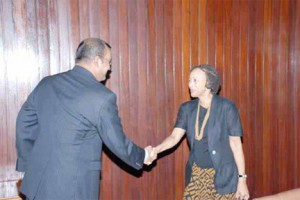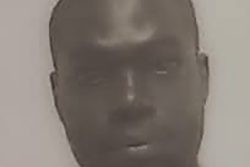The Report on Promotion and Protection of All Human Rights, Civil, Political, Economic, Social and Cultural Rights, Including the Right to Development by the United Nations Expert on Minority Issues has ignited a firestorm of controversy. The administration has rejected it almost entirely and the opposition has embraced it enthusiastically. Rather than quarrel, both sides need to heed the omens and learn the lessons the report is trying to teach.

The administration does not take kindly to criticism from anywhere. Every year, for example, it routinely rejects a raft of reports – the International Narcotics Control Strategy Report; Country Report on Human Rights Practices; and Trafficking in Persons Report – that the United States Department of State issues. All of them, invariably, are critical of the administration’s record of governance. President Bharrat Jagdeo said that, earlier this month, he complained personally to US President Barrack Obama about Guyana’s poor ranking in the most recent Trafficking in Persons Report. Back in 2005, the administration even complained about the Commonwealth Secretariat’s Needs Assessment of the Guyana National Assembly.
It was no surprise, therefore, that Cabinet Secretary Dr Roger Luncheon last month announced that the administration had submitted an official protest in response to Ms Gay Mc Dougall’s Promotion and Protection of all Human Rights, Civil, Political, Economic, Social and Cultural Rights, Including the Right to Development: Report of the Independent Expert on Minority Issues, that was presented to the Human Rights Council in Geneva.
Although it is public knowledge that Ms McDougall and her technical team met President Bharrat Jagdeo and had formal sessions with cabinet ministers, the Cabinet Secretary complained that her engagements were independently organised by the Guyana Human Rights Association which he described as an “anti-government, so-called independent non-governmental organisation.” The GHRA, however, had nothing to do with compiling the report; that was the task of the McDougall team which consulted widely in accordance with its mandate.
The fact is that, whether the administration accepts the Report and whether it refuses to recognise the reality of people’s perceptions, it should not mean that the findings are invalid and should not be recorded. It would be a grave error, however, for the administration to encourage state agencies and commissions and the public at large to ignore or reject the Report, a process that has started already in state-owned media. There is nothing to be gained by pretending that the situation is fine when it is not. The consequences of allowing the conditions to fester can be catastrophic.
Context
The current Report should be placed in the context of a continuum of formal reporting based on Guyana’s adhesion to six human rights conventions − The International Convention on Civil and Political Rights; International Covenant on Economic, Social and Cultural Rights; International Convention on the Elimination of All Forms of Racial Discrimination; International Convention Against Torture and Other Cruel, Inhuman or Degrading Treatment or Punishment; International Convention on the Elimination of All Forms of Discrimination Against Women; and International Convention on the Rights of the Child. These conventions all require compliance by the state party.
In compiling this report, McDougall stated clearly that she “focussed her attention on the relations between, and comparative situations of Afro-Guyanese and Indo-Guyanese…Since matters relating to indigenous peoples fall within the mandate of the Special Rapporteur on the Situation of Human Rights and Fundamental Freedoms of Indigenous Peoples, they will not be covered in this report.”
It is obvious, therefore, that the report did what it was intended to do by examining what was perceived to be the most menacing ethnic relations problem whether or not that was the administration’s expectation.
Some sections of an earlier report − Racism, Racial Discrimination, Xenophobia, and All Forms of Discrimination − which was submitted by Doudou Diène, the Special Rapporteur on Contemporary Forms of Racism, Racial Discrimination, Xenopho-bia and Related Intolerance, need to be recalled. That Report, published five years ago, had found then that “every level of Guyanese society is permeated by a profound moral, emotional and political fatigue, arising out of the individual and collective impact of ethnic polarisation.”
McDougall records that she witnessed a continuing societal malaise that shows evidence of having deepened and transformed in some instances into “despair, anger and resistance.” Clearly, the ethnic relations situation has deteriorated since Diène’s report.
Content
McDougall said that she recognised that the administration had taken commendable steps to address issues of ethnic tensions, criminal activities and economic underdevelopment. She emphasised, however, that ethnically divided political and administrative structures and failed political processes have created “deep frustrations and distrust” in the institution of government. As a result, further effective action is required urgently to restore confidence in good governance and the rule of law among all communities, and prevent an inexorable slide into further polarisation and possible violence.
The Report addresses five main areas of concern − Employment and economic activity; Land and housing; Access to justice; Media; Protection against violence; and, Identity, language, Culture and religion. Of these, the most frightening deals with protection against violence.
McDougall suggests that many members of one of the country’s larger minority group − the African-Guyanese − feel that they are systematically discriminated against. That perception springs from several sources. The incontrovertible evidence is that a disproportionately large number of African-Guyanese have been the target of “serious rights violations…including arbitrary detention without trial, torture, deaths and mistreatment in custody, and killings of innocent civilians.”
These abuses have occurred particularly during Joint Services operations such as the recent Operation Restore Order. In villages such as Buxton which is predominantly African, the excesses of the Joint Services have caused anger and resentment among community members who feel targetted and who feel that “their entire community is treated as a population of criminals.” Concerns were raised about the numerous killings of young African-Guyanese men from 2002 to the present day and the existence of what has been described as a “phantom death squad.” Further, the state has failed to adequately record or investigate the murders.
In every meeting, McDougall records that she was told of “a climate of fear…the distrust of the government security forces is palpable and there is what seems to be a fairly consistent narrative of use of excessive force and impunity.”
The Report expressed concern about the stigmatisation of young, male African-Guyanese and entire communities, noting that persons reported feelings of being “excluded, discriminated against and victimised.” This has contributed to a climate of “suspicion and conspiracy theory” within the African-Guyanese community which threatens to undermine social stability.
The Report says that there is a widespread sense that there is a systematic effort to exclude African-Guyanese as an ethnic group from positions of influence, power or economic status and point to a growing “resistance movement” among African- Guyanese in response to exclusion and discrimination. Dangerously, moderate voices are increasingly being drowned out by more radical elements and racially divisive opinions.
Division
It is easy to see why the Report has so angered and embarrassed the administration. It suggests that, at worst, the administration which represents the majority had condoned abuses against the minority. At best, its efforts to ameliorate the abuses have been ineffective.
President Jagdeo himself, in response to the Report, declared “We have an open society; we have nothing to fear, because it is not the policy of my government to discriminate against anyone based on race or religion or any other issue…I come from a party that abhors racism, recognises that racism eats out the issue at the heart of societies and for us, all of our people are important and you see that reflected in my government’s policy.”
The fact is that, abhorrent or not, Guyana is a house divided; racism does exist, and not because the Report says so. More chillingly, the Report asserts that the country is divided and the two larger ethnic groups see things differently:
“Ethnically based divisions and politics have created two separate and conflicting narratives and perceptions of reality in Guyana. On the part of the Afro-Guyanese, there is a widely held belief that they are discriminated against by an Indian-dominated and supported government that puts Indian interests to the fore, particularly in resource allocation, government contracts and employment. On the part of the Indian-Guyanese, there is a belief that an Afro-Centric political opposition, if in power, would settle political scores and work solely in the interests of Afro-Guyanese.”
These perceptions have spawned “a bitter and destructive political environment that has infected the wider society and is failing the people of Guyana. This must give way to a climate of truth, reconciliation and compromise.” That will not be easily accomplished. The administration must take the lead in repairing the damage to ethnic relations in order to forestall a decline into lawlessness not only by fighting crime but, also, by fighting the causes of crime.
McDougall calls for a new era of “political will and strong, visionary leadership” which are required to realise change and reverse the economic and social stagnation evident in a divided Guyana. When will that era begin?






